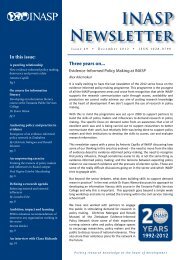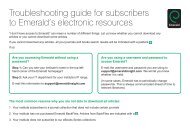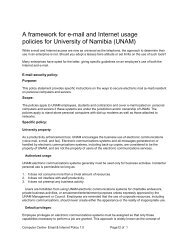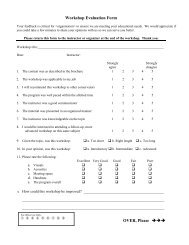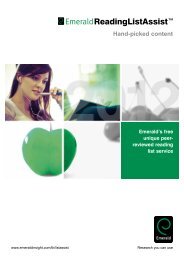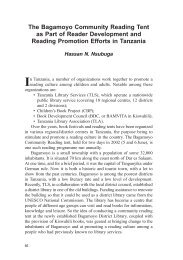What is the evidence on evidence-informed policy making? - INASP
What is the evidence on evidence-informed policy making? - INASP
What is the evidence on evidence-informed policy making? - INASP
Create successful ePaper yourself
Turn your PDF publications into a flip-book with our unique Google optimized e-Paper software.
<str<strong>on</strong>g>the</str<strong>on</strong>g>refore include <str<strong>on</strong>g>the</str<strong>on</strong>g>m in <str<strong>on</strong>g>the</str<strong>on</strong>g>ir budgets. However o<str<strong>on</strong>g>the</str<strong>on</strong>g>rs felt that c<strong>on</strong>tinuing to pay<br />
such fees just propagates <str<strong>on</strong>g>the</str<strong>on</strong>g> problem and that those funding research<br />
communicati<strong>on</strong> and uptake work should take a ‘zero-tolerance’ approach. <str<strong>on</strong>g>What</str<strong>on</strong>g><br />
both sides of th<str<strong>on</strong>g>is</str<strong>on</strong>g> argument agreed <strong>on</strong> was that those who aim to support <str<strong>on</strong>g>evidence</str<strong>on</strong>g><strong>informed</strong><br />
<strong>policy</strong> <strong>making</strong> need to acknowledge <str<strong>on</strong>g>the</str<strong>on</strong>g>se <str<strong>on</strong>g>is</str<strong>on</strong>g>sues and decide how <str<strong>on</strong>g>the</str<strong>on</strong>g>y will<br />
resp<strong>on</strong>d to <str<strong>on</strong>g>the</str<strong>on</strong>g>m from <str<strong>on</strong>g>the</str<strong>on</strong>g> outset.<br />
How <str<strong>on</strong>g>evidence</str<strong>on</strong>g>-literate are <strong>policy</strong> makers: Examining <str<strong>on</strong>g>the</str<strong>on</strong>g><br />
knowledge, skills and attitudes of <strong>policy</strong> makers<br />
A large number of presentati<strong>on</strong>s focused <strong>on</strong> <str<strong>on</strong>g>the</str<strong>on</strong>g> capacity (knowledge, skills and<br />
attitudes) of <strong>policy</strong> makers to use <str<strong>on</strong>g>evidence</str<strong>on</strong>g> for <strong>policy</strong> <strong>making</strong>. Presentati<strong>on</strong>s<br />
revealed that at present <str<strong>on</strong>g>the</str<strong>on</strong>g>re <str<strong>on</strong>g>is</str<strong>on</strong>g> ra<str<strong>on</strong>g>the</str<strong>on</strong>g>r little research <str<strong>on</strong>g>evidence</str<strong>on</strong>g> <strong>on</strong> <strong>policy</strong> makers’<br />
ability to use research. Most research in th<str<strong>on</strong>g>is</str<strong>on</strong>g> area has examined <strong>policy</strong> makers’<br />
percepti<strong>on</strong>s of <str<strong>on</strong>g>the</str<strong>on</strong>g>ir own ability and what <str<strong>on</strong>g>the</str<strong>on</strong>g>y need in order to use research and, as<br />
stated by Kirsty Newman (UK) ‘most people d<strong>on</strong>’t know what <str<strong>on</strong>g>the</str<strong>on</strong>g>y d<strong>on</strong>’t know!’.<br />
There <str<strong>on</strong>g>is</str<strong>on</strong>g> however a small body of research which attempts to objectively analyse<br />
<strong>policy</strong> makers’ capacity and, encouragingly, a number of <strong>on</strong>going projects were<br />
presented suggesting that <str<strong>on</strong>g>the</str<strong>on</strong>g> body of research <str<strong>on</strong>g>evidence</str<strong>on</strong>g> will increase in <str<strong>on</strong>g>the</str<strong>on</strong>g><br />
coming years.<br />
Two presentati<strong>on</strong>s focussed <strong>on</strong> parliaments. Fanwell Banda (Zambia) described a<br />
study using an <strong>on</strong>line diagnostic test aimed to assess <str<strong>on</strong>g>the</str<strong>on</strong>g> <str<strong>on</strong>g>evidence</str<strong>on</strong>g>-literacy<br />
(including informati<strong>on</strong> searching skills, understanding of research/science and ability<br />
to extract meaning) of <str<strong>on</strong>g>the</str<strong>on</strong>g> parliamentary staff of Zambia. Participants had all<br />
identified <str<strong>on</strong>g>the</str<strong>on</strong>g>mselves as needing to use research as part of <str<strong>on</strong>g>the</str<strong>on</strong>g>ir job and were<br />
mainly parliamentary researchers or librarians. They scored poorly <strong>on</strong> most areas of<br />
<str<strong>on</strong>g>the</str<strong>on</strong>g> test. For example, <strong>on</strong>ly <strong>on</strong>e in five was able to pick from a l<str<strong>on</strong>g>is</str<strong>on</strong>g>t <str<strong>on</strong>g>the</str<strong>on</strong>g> correct<br />
definiti<strong>on</strong> of a random<str<strong>on</strong>g>is</str<strong>on</strong>g>ed c<strong>on</strong>trolled trial (RCT) while <strong>on</strong>ly <strong>on</strong>e in three believed<br />
<str<strong>on</strong>g>the</str<strong>on</strong>g>re was c<strong>on</strong>sensus that <str<strong>on</strong>g>the</str<strong>on</strong>g> CIA did not invent HIV. Chandrika Nath (UK) presented<br />
findings from a study carried out jointly by <str<strong>on</strong>g>the</str<strong>on</strong>g> Ugandan Parliament, <str<strong>on</strong>g>the</str<strong>on</strong>g> Ugandan<br />
Academy of Science and <str<strong>on</strong>g>the</str<strong>on</strong>g> UK Parliamentary Office of Science and Technology<br />
which examined <str<strong>on</strong>g>the</str<strong>on</strong>g> handling of science and technology <str<strong>on</strong>g>is</str<strong>on</strong>g>sues by <str<strong>on</strong>g>the</str<strong>on</strong>g> Ugandan<br />
Page 5



